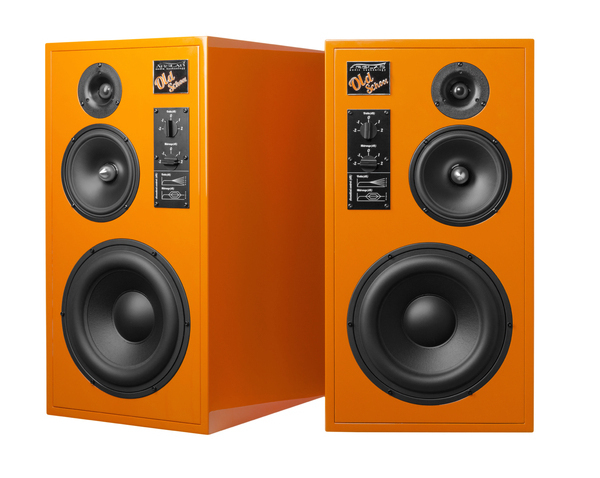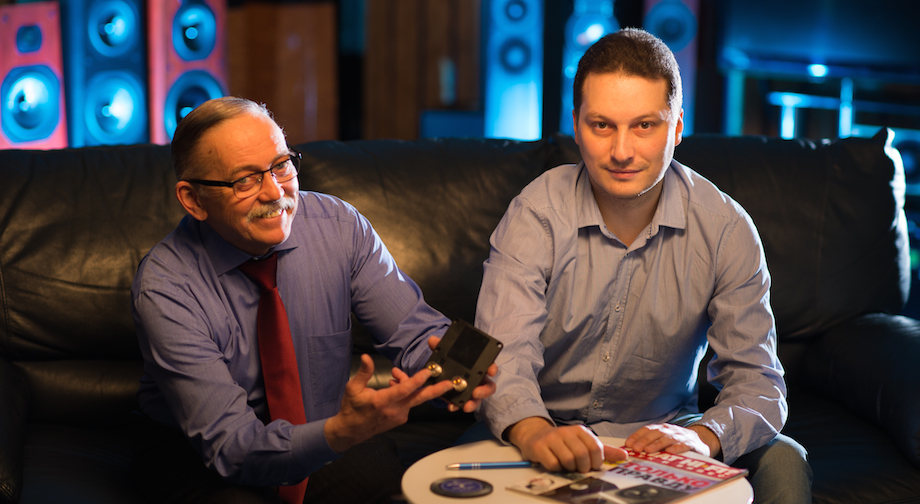Own brands as a tool for business survival in a crisis: the experience of Audiomania

Shelf acoustics Arslab Old School Superb 90
Today we’ll talk about how to keep up with the tastes of consumers who change in accordance with the ruble exchange rate, and what interesting business can offer its fans in times of economic instability.
Crisis: a reason to compromise
The crisis has changed the alignment of product groups, brands and target audiences of almost any business. The most striking example is the sphere of sales of electronics, and especially equipment intended for music lovers: goods that they planned to purchase earlier became inaccessible to certain segments of customers. And since the purchase issue has not gone away, people began to look for alternatives, compromises.
The downside of the situation in the crisis is that the vendors offering electronics (and especially Hi-Fi and High-End audio equipment, which is most relevant for Audiomania) in a large price range, there are not so many compromise solutions in the “ there may not be a top-end manufacturer.
However, the number of brands that are “on everyone’s ears” is also small, so customers are more focused, for example, on solving the problem of comfortable listening to music or watching movies, and not on purchasing goods from a particular manufacturer. The direct pursuit of brands was replaced by the search for optimal solutions for the tasks that the buyer would like to solve.
Today, buyers of audio equipment readily come to a demonstration of the equipment of brands whose names they first heard. The main thing is that the proposal is suitable for the price, quality and nature of the sound, fit into the interior, if it is important, and have technical support in the person of a representative office of a particular brand or seller.
Time for Change: How the Market Has Changed
But back to the beginning of the exchange rate hike. Although the main characters of the news in December 2014 were home appliance stores and stories about how customers panicked about buying refrigerators and televisions, Audiomania also experienced a surge in sales during this period.
December 2014 was a record for the entire history of the company, if you count in rubles. People really did not know what to do. Many people remember the default when those who had rubles in their hands lost a lot. Therefore, of course, those who planned to purchase imported goods, and most of them in our assortment, rushed to realize their plans. And well done. After all, one can only dream about the dollar exchange rate, which then revolved around 55 rubles.
December 2015 turnover did not catch up with December 2014 indicators. There was a traditional New Year surge, but the company did not see any panic. But the structure of demand and the composition of the target audience for 2015 have changed quite strongly.
Due to the fact that the income in rubles from the majority of buyers remained unchanged (or even decreased), part of the audience, which was classified as a middle class in Audiomania, left this zone and ended up almost in the “budget” segment. The premium class has become average. And part of the customers generally ceased to be the target audience of the company.
Of course, in reality, these processes took some time, so they did not notice a sharp change in the composition of the audience. As a result, the average bill of Audiomania practically did not change in comparison with the pre-crisis period - in rubles, of course.
If anything has changed over the past year, it’s the ability to predict the number of orders. Previously, companies could clearly predict the seasonality of demand and even made monthly forecasts for turnover with almost 98% accuracy, but now it is impossible to use historical data from previous years in work.
Everything that existed before 2015 “no longer matters”: it is impossible to make forecasts based on these data.
However, 2016 in Audiomania began optimistically. In comparison with the same period last year, January 2016 brought Audiomania 26% more orders. People are gradually learning to live in new conditions: they are getting used to, looking for alternatives and are interested in domestic developments in the field of audio, which in the crisis period can “shoot” and win a decent market share from Western brands.
Own brands as an anti-crisis tool
Audiomania not only sells audio equipment, but since 2008 has been releasing its own speaker systems (Arslab brand). Arslab acoustics are manufactured in Riga, some of the best employees who worked at the Radiotehnika factory in Riga are employed, and model development is led by Russian engineers.

Yuri Fomin (left) and Artem Faermark (right) / Photo by Stereo.ru
It would seem, why create production, develop new models of speakers, if you can sell what someone has already made and successfully brought to the market? First of all, retailers are enough now - and we don’t want to be just “one of many”.
In addition, offering our own interesting product to the market, we easily compete with other manufacturers. And since in Russia the production of audio equipment is still at the level of “artisan workshops” and amateur home-made products (there are practically no such domestic manufacturers of acoustics), we are talking about competition exclusively with Western brands - but on the local market.
Another important point - in the market for high-quality audio, there are not so many well-known brands. People often don’t know exactly which manufacturer’s product they need, and seek the advice of a company they trust. Therefore, the brand "Audiomania", in which we also invest a lot of money and effort, is showing itself perfectly.
The presence of our own brands, the ability to manage production, to develop and produce models that are in high demand at the moment is a very powerful tool in a crisis. But in order to use this tool, constant contact with customers is necessary: communicating with them, we determine what interests them, which products are most popular now (and not only in relation to their own brands).
Besides the fact that it is necessary for successful sales, it is also useful for statistics. Understanding demand and its dynamics is the key to success at all times. And now it is doubly valuable.
The ability to directly contact the final consumer of the product that retail provides is our great advantage over the “traditional” manufacturers of audio equipment. The fact is that usually production is very far from the consumer. Between the buyer and the manufacturer there are a retail store, a distributor, and sometimes a wholesale company. There is practically no feedback. And when it is, there is a large time delay.

Artem Faermark / Photo Stereo.ru
In addition, in different countries the demand is different. Therefore, in order to produce a commercially viable product that will sell well, the manufacturer needs a lot of research. The main difficulty in this case is the collection of data from end users, which can take a long time and is very difficult, since the brand does not have “organic” channels of access to the buyer: the “layer” of intermediaries in the form of wholesalers, distributors and retailers interferes - and each country where equipment is sold has a different composition of this “layer”.
In this case, it’s much easier for us to work: the Arslab brand is focused on Russia, and there are no intermediaries between production and the buyer. Therefore, we can quickly introduce new models, change priorities in production.
It turns out that everyone benefits from the “symbiosis” of the retailer and manufacturer: both the store and the production. Buyers know that we are really well versed in audio equipment, and not just resell the goods - even if the choice is not on the products of our own brand. Retail gives you the opportunity to directly find out the mood of customers and timely respond to them.
The idea of combining production and sales is nothing new, but our tasks are different from those set by other companies that go this way. We are not trying to add everything that is on the market to our assortment and wait until demand arrives - on the contrary, we are interested in offering the market the most curious, “tasty” products.
We make different products for different target audiences: not without reason, for example, Audiomania was included in the capital of the Finnish acoustic producer Penaudio (now the products of this brand are also manufactured at the factory in Riga - we even managed to improve the production technology compared to the Finnish one).

Shelf speakers Penaudio Charisma
For Audiomania and Penaudio, this collaboration is an opportunity to distribute business tasks: Audiomania is engaged in the production and promotion of the Finnish brand in the Russian and world markets, and Penaudio founder Sami Penttila can completely concentrate on the design of new acoustic models.
We also have no task of making the “cheapest” columns. Arslab brand is launched under the slogan “High-End at the price of Hi-Fi,” but this is our opportunity to offer the market a quality product at a guaranteed competitive price, and not an attempt to save on everything. In general, pricing for our own brands is based on the scheme when the price matches the product, and the product is slightly better than what the consumer expects.
Prices for high-end audio systems are usually measured in six- or even seven-digit numbers, while many Arslab models can be bought at prices within one hundred thousand rubles and lower - that is, several times cheaper. It often happens that at exhibitions customers tell us: "Your speakers for 80,000 sound better than the system for half a million in the next room." This means that we did everything right.
During a period of economic instability, such a pricing model becomes especially popular: the demand for Arslab speakers in Russia significantly exceeds supply (the prices for Audiomania's “own” speakers due to the crisis still had to be increased, but disproportionately to the exchange rate). In Russia, Arslab acoustics has become even more competitive than before - it played a role in increasing sales. As a result, the turnover of 2015 on Arslab products grew by 51% compared to 2014.
Now (despite the crisis, and in a way thanks to it) the brand’s main goal is to reach a new production level, to ensure as many Russian music lovers as possible acoustics at reasonable prices.
As for the goals of Audiomania as a retailer, we strive to ensure that all 100% of sales are accounted for by our own brands and exclusive deliveries, when we buy goods directly from the manufacturer abroad, and not from the local distributor / wholesaler (now our brands and exclusive deliveries account for more than 40% of sales).
This is an approach that allows you not only to “resell something”, but to build trust between the manufacturer and the end user. The buyer who purchases the goods “seriously and permanently” (and in the field of audio technology the way it should be), this, of course, deserves it: both in a crisis and at any other time.
PS More materials on the topic of audio - in our blog " World of Hi-Fi ."
